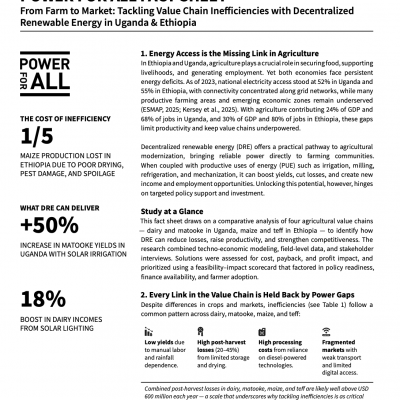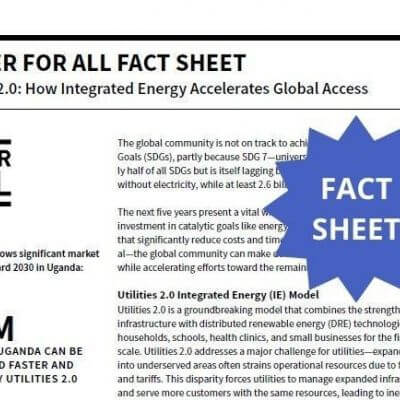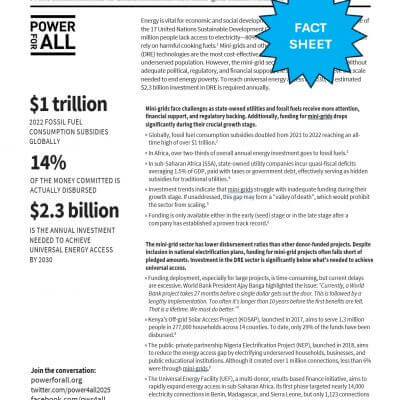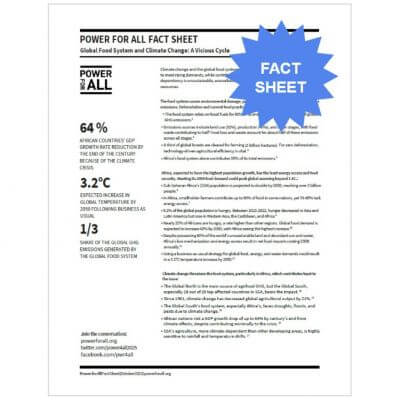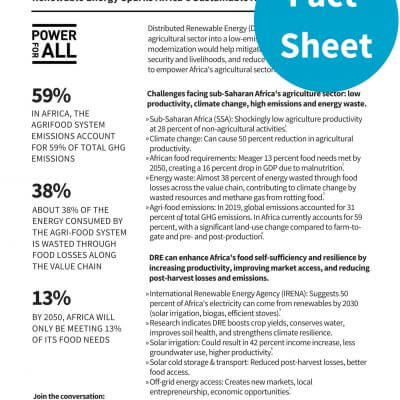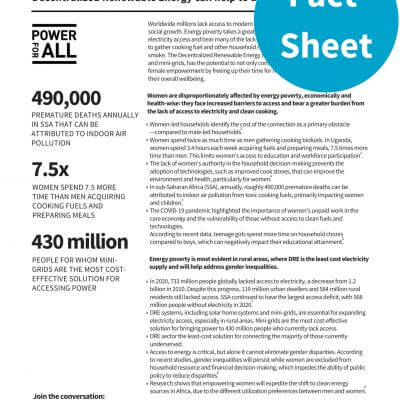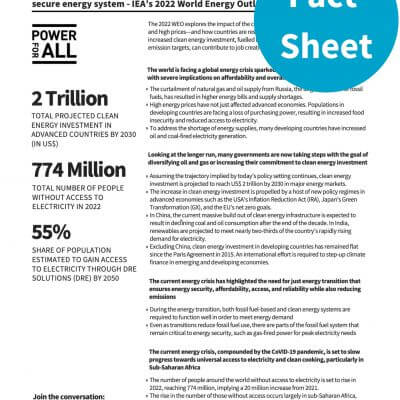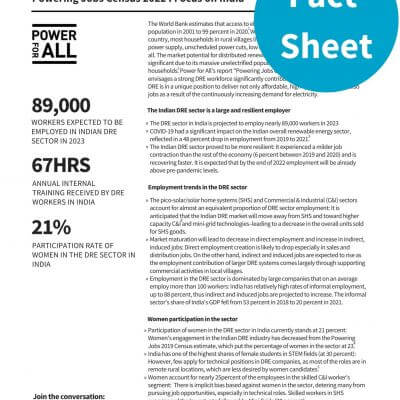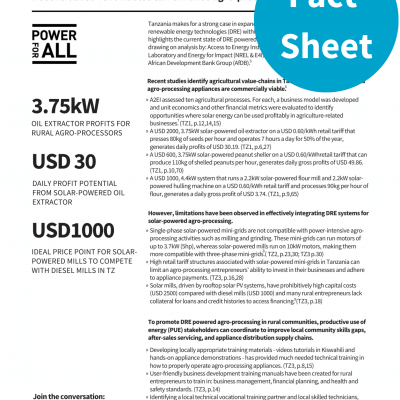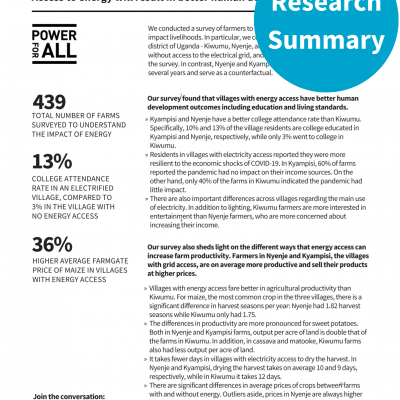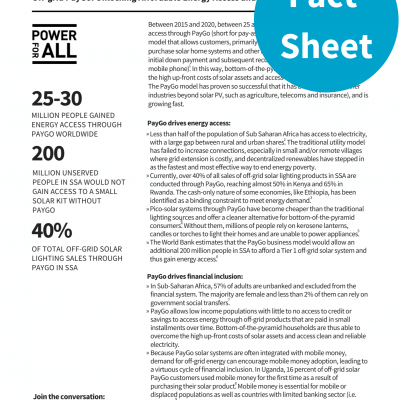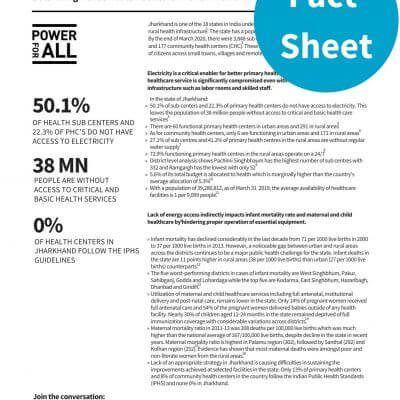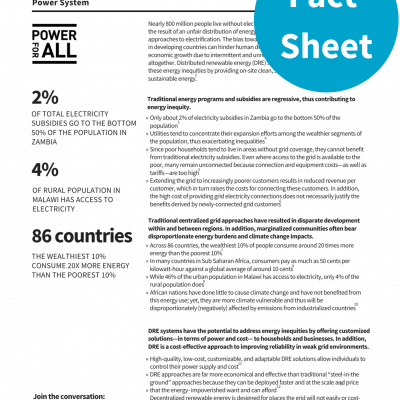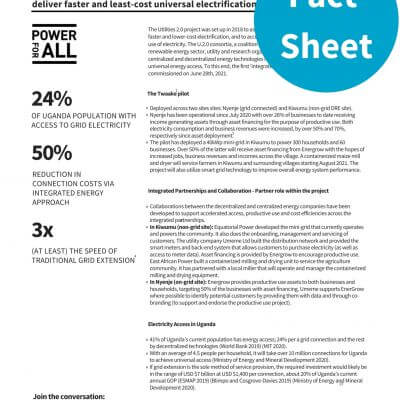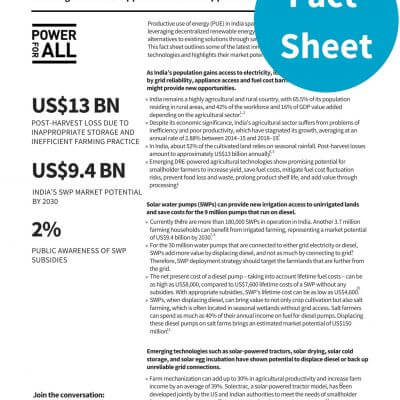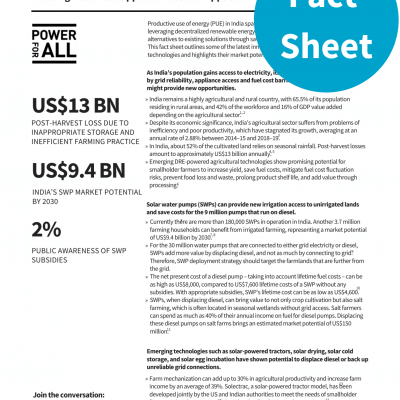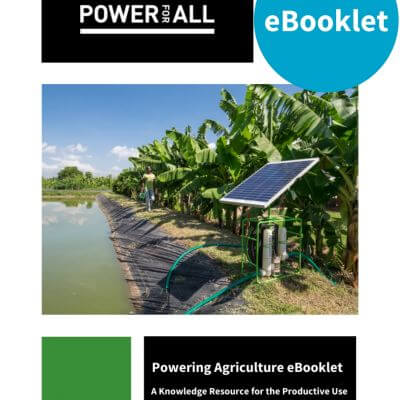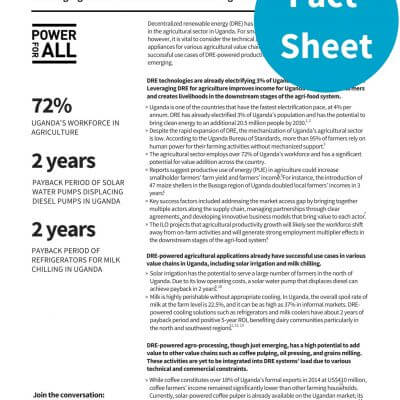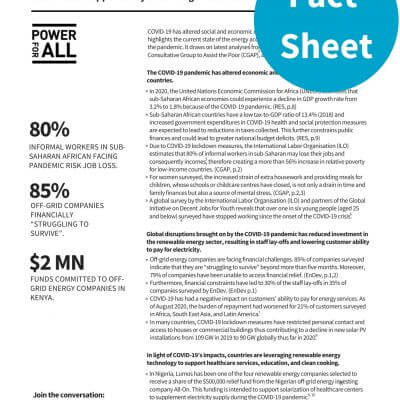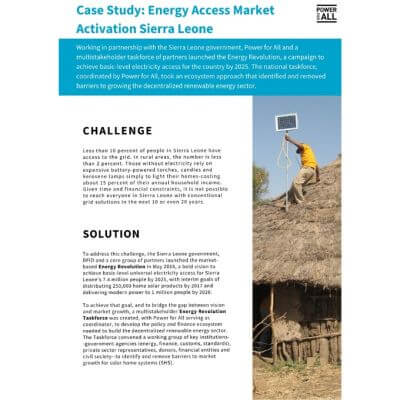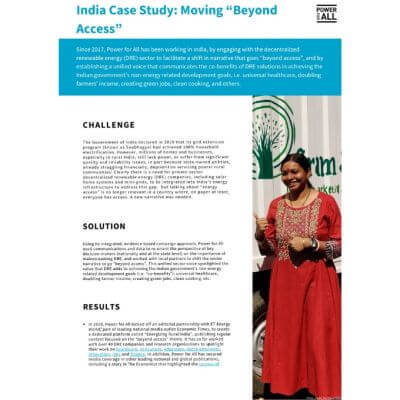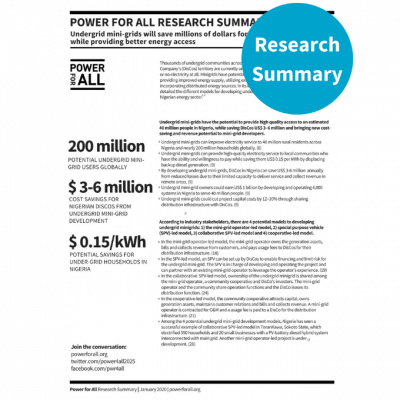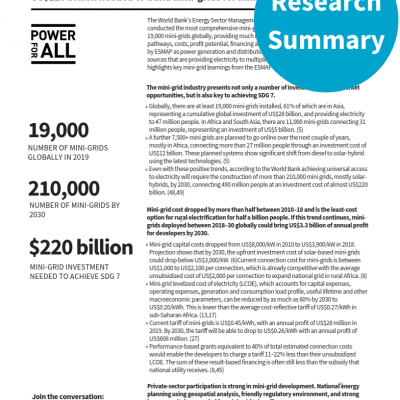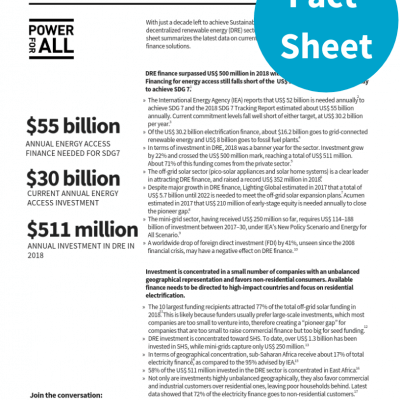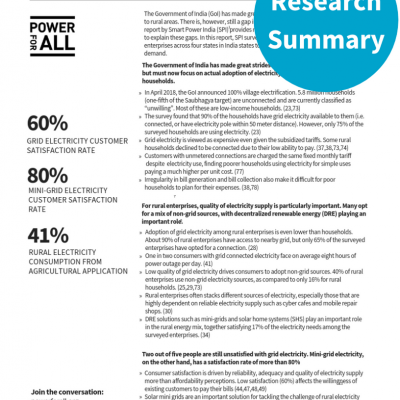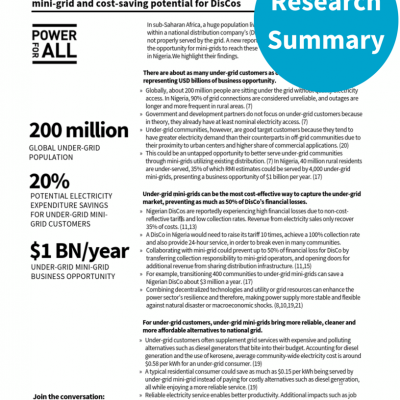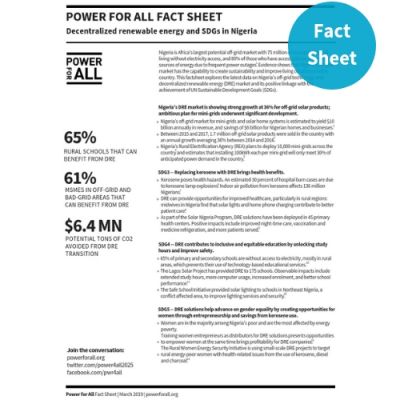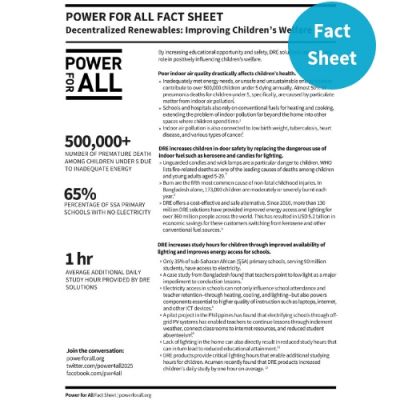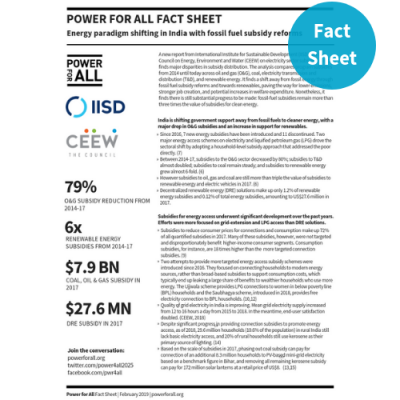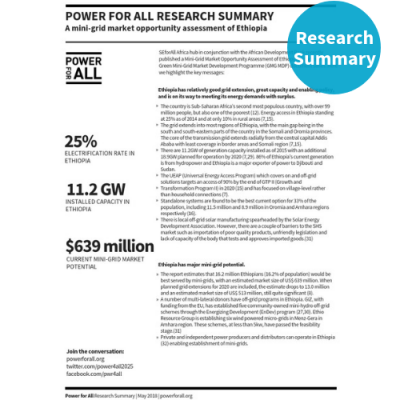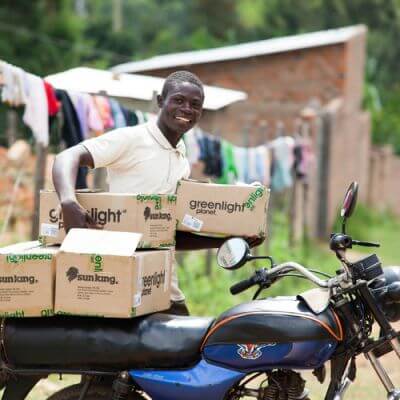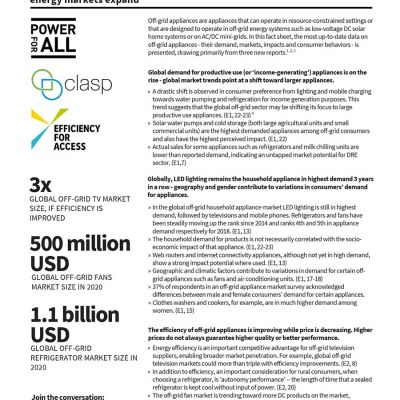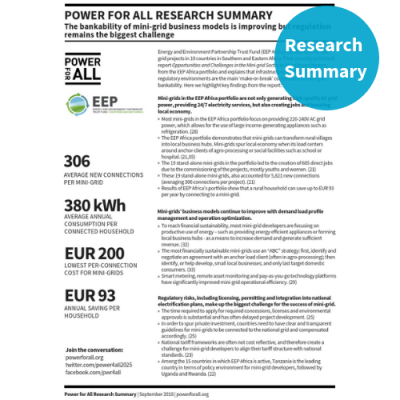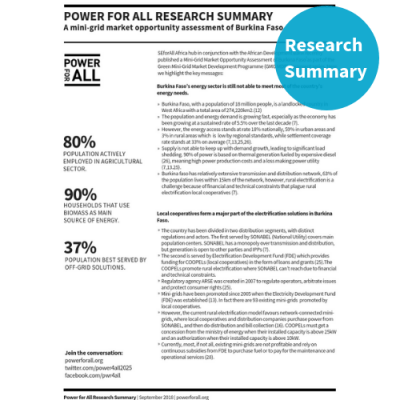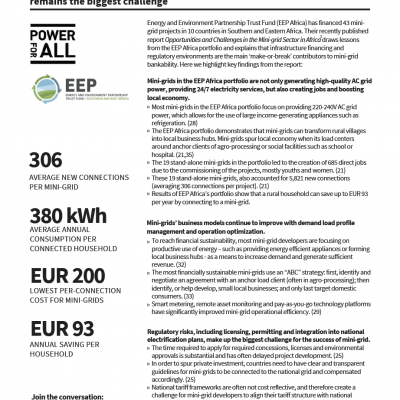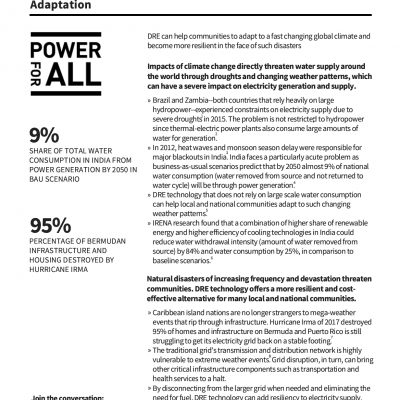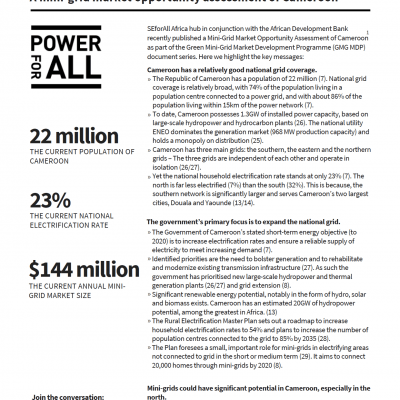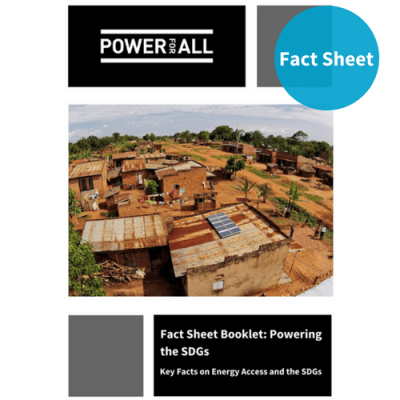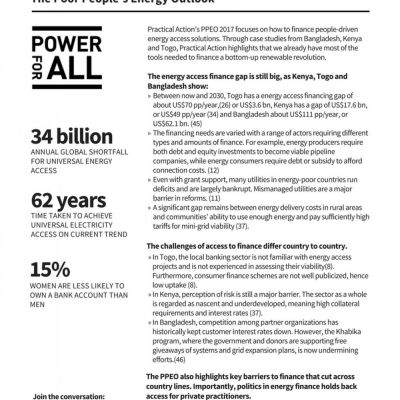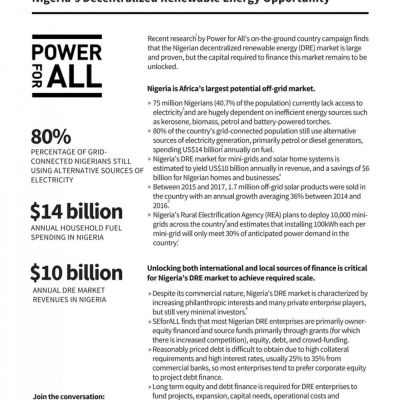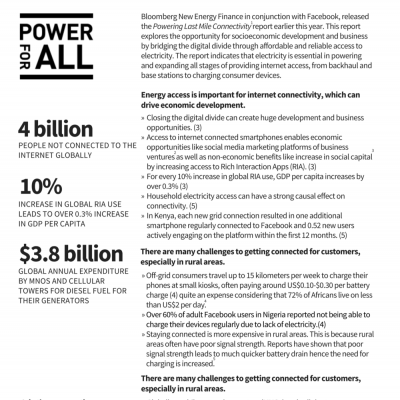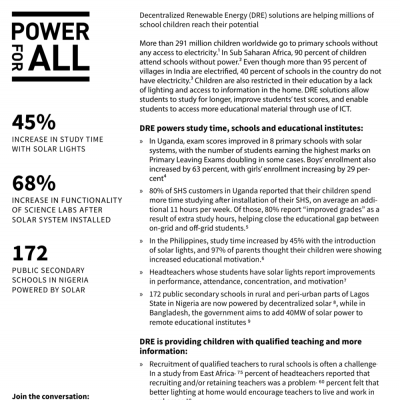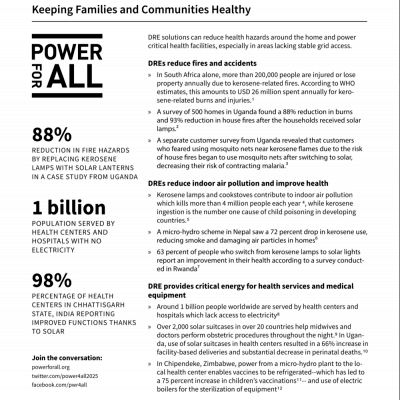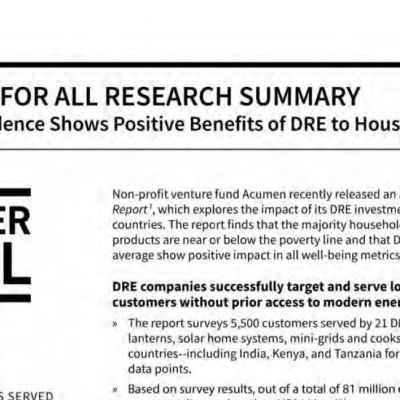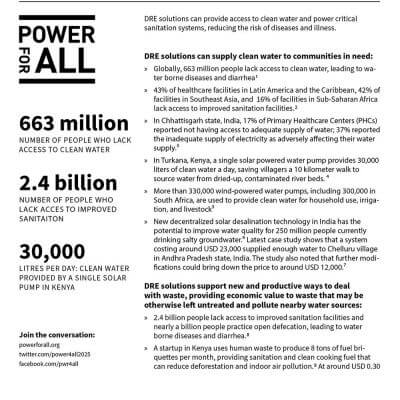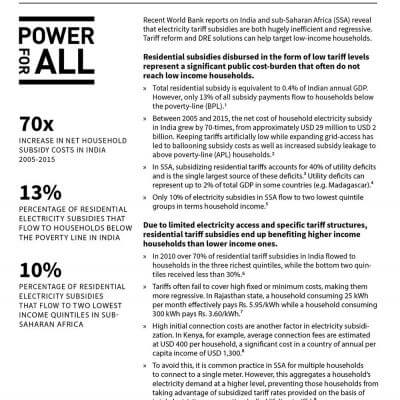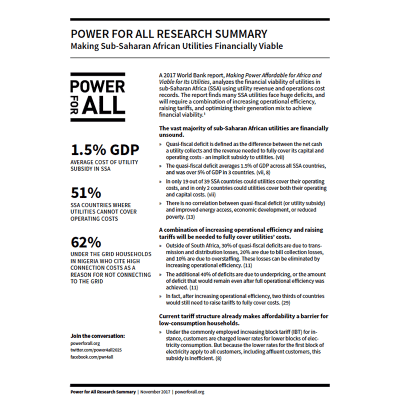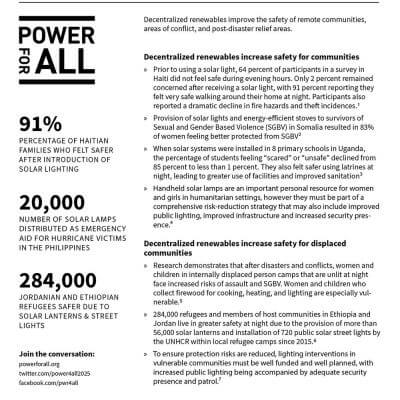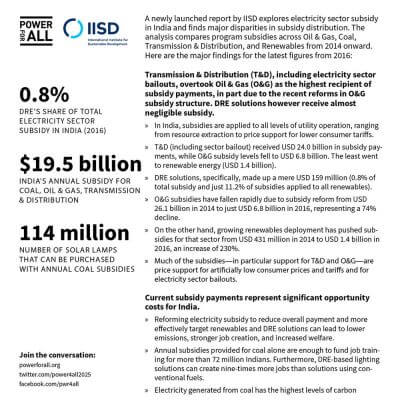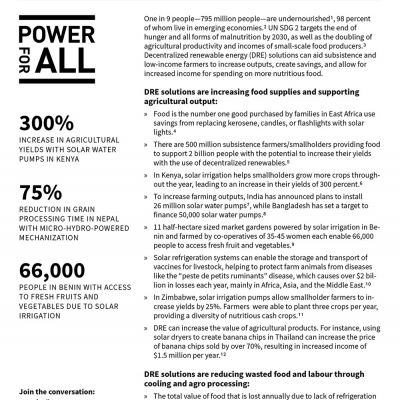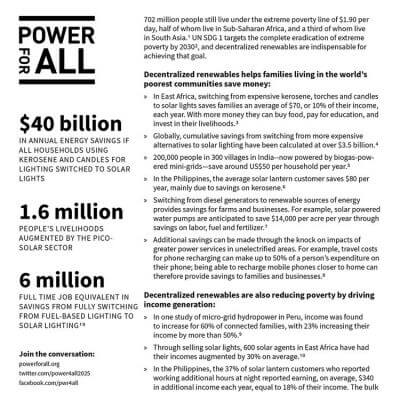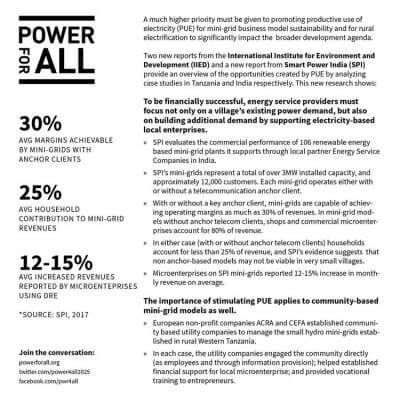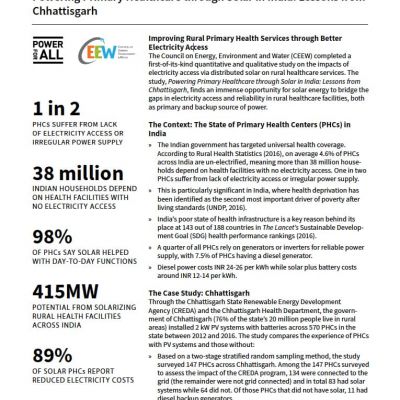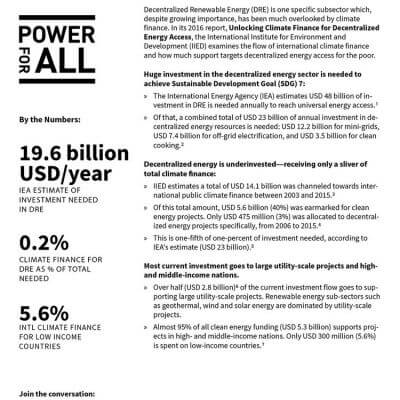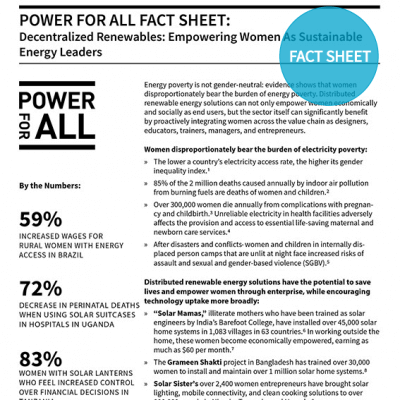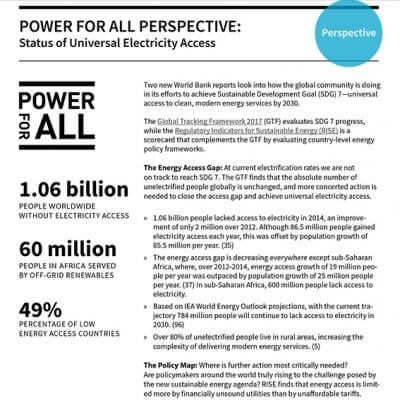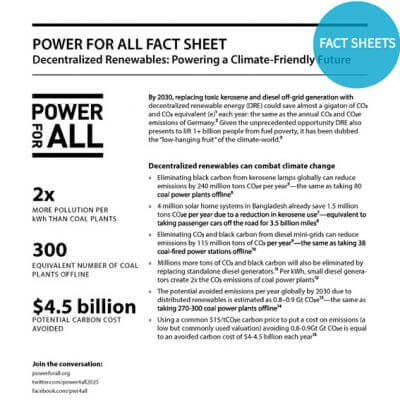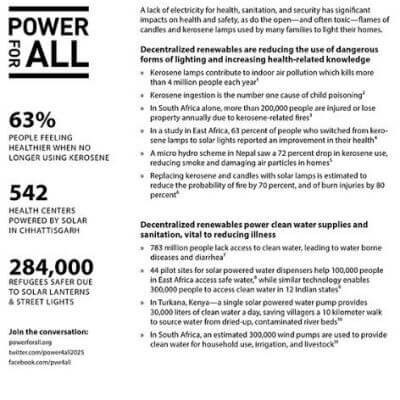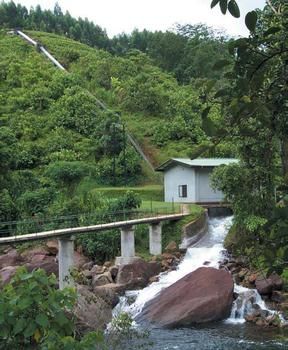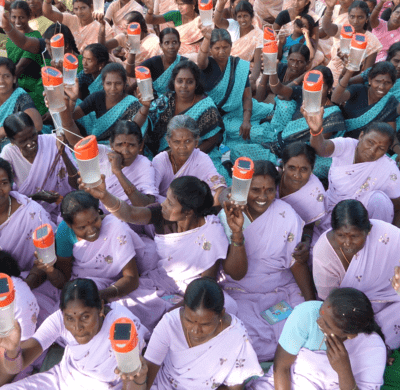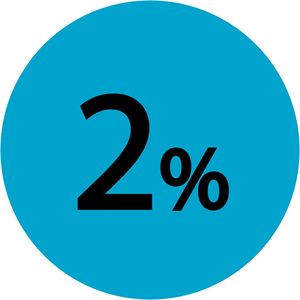Energy Access is the missing link in agriculture - In Ethiopia and Uganda, agriculture plays a crucial role in securing food, supporting livelihoods, and generating employment. Yet both economies face persistent energy deficits.
Over the last decade, DRE technologies attracted over USD 3 billion, but $2.3 billion is needed annually to achieve universal energy access by 2030. Power for All recommends Key Performance Indicators (KPIs) to track financial progress, including the alignment between approved and disbursed funds (currently only 14% disbursed), the share of funded sites (currently 20% of projects receive support), and donor money per connection (with only 17% of CAPEX currently covered). These KPIs highlight critical funding gaps in the mini-grid sector, highlighting where progress is needed.
Distributed Renewable Energy (DRE) can revolutionize Africa's agricultural sector, creating a sustainable, low-emission food system. This transformation can combat climate change, enhance food security, and reduce income inequality.
The Decentralized Renewable Energy (DRE) sector is uniquely positioned to combat energy poverty and enable female empowerment by freeing up productive time, providing employment opportunities, and improving their overall well-being.
Will governments around the world create a safety net for electricity consumers by accelerating the establishment of new renewable energy projects?
Power for All’s report "Powering Jobs Census 2022: Focus on India'' envisages a strong decentralized renewable energy (DRE) workforce significantly contributing to India's energy transition.
Decentralized Renewable Energy (DRE) sources can enhance agro-productivity and food security. This Fact Sheet highlights the current state of DRE powered agro-processing activities in Tanzania, drawing on analysis by: Access to Energy Institute (A2EI), The National Renewable Energy Laboratory and Energy for Impact (NREL&E4I), the Energy Change Lab (the Lab), and African Development Bank Group (AfDB).
The agricultural sector has the potential to become a game-changer in sub-Saharan Africa (SSA), where 80%of the production is from smallholder farmers. However, less than one in three farmers have electricity access.
PayGo (short for pay-as-you-go) is a system that allows customers to purchase solar home systems and appliances through installments. It has not only enabled bottom-of-the-pyramid households to access clean energy but it is also creating opportunities for financial inclusion and economic development.
Nearly 38 million people in the state of Jharkhand, India, do not have access to critical and basic health services. Decentralized Renewable Energy can empower the 4000 rural health centers with reliable electricity, which will ensure quality health care for all in the state.
Nearly 800 million people live without electricity, and millions more have only intermittent or unreliable access worldwide. Distributed renewables can address energy inequities by offering customized solutions that provide clean, sufficient, affordable, reliable, and sustainable energy.
It will take over 10 million connections for Uganda to achieve universal access. If grid extension is the sole method of service provision, the required investment would likely be in the range of USD $13 billion at USD $1,300 per connection. Utilities 2.0 integrated energy approach seeks to bring the optimal mix of service levels to unelectrified areas, solving for least-cost electrification in the fastest timeline possible in a given area.
As of 2019, 4.3% of India’s rural Primary Health Centres (PHCs) did not have access to electricity. While the upfront cost of a solar system is high for most PHCs, displacing diesel generators with a solar system can save 80% of a health centers’ energy costs while bringing many benefits in improved healthcare services.
With 65% of its population in rural areas, India remains a highly agricultural country. Yet post-harvest losses amount to approximately US$13 billion annually. Emerging agricultural technologies powered by decentralized renewables show promise for farmers but require new deployment strategies.
Productive use of energy solutions leveraging decentralized renewable energy show promising potential for smallholder farmers to increase yield, however, DREs require different deployment strategies. India’s solar water pump experience provides valuable insights for other emerging technologies.
Solar-powered machinery in off-grid and weak-grid areas could improve food security and create new employment opportunities. However, commercial maturity remains hindered due to high capital costs. Greater deployment of capital is needed.
Agriculture is 2-4 times more effective at reducing poverty than other sectors, according to the World Bank. In this new booklet, we have brought together the clearest data points articulating the direct relationship between decentralized energy access and agriculture productivity and food security.
In Uganda, research shows that electrifying agricultural activities can bring additional income for smallholder farmers. However, agro-processing activities are yet to be integrated into distributed renewable energy systems’ load due to various technical and commercial constraints.
Power for All compiled a two-page overview of the socio-economic impact of COVID on the energy access sector, and highlights how some countries are responding by leveraging recent advances in decentralized renewables.
Mini-grids productive use of energy in agriculture holds great promise to rural economic development in Africa. However, to ensure long term economic viability, mini-grid developers should build a strong understanding of agricultural practices and adapt project design to the local context.
In 2016, Power for All in partnership with the Sierra Leone government launched a market-based Energy Revolution which identified and removed barriers to growing the decentralized renewable energy sector and led to significant impacts.
Using its integrated, evidence-based campaign approach, Power for All has used communications and data since 2017 to shift the narrative on the importance of mainstreaming decentralized renewable energy in India and going “beyond energy access”.
60 Decibels' new impact report, drawn from 35,000 customer interviews, offers a deep dive into why off-grid renewable energy matters and how it can help many more of the world’s energy poor.
To achieve SDG 7, the International Energy Agency says Africa needs to triple the average number of people who gain energy access every year, and this requires governments to make a shift to more renewable energy sources.
According to a new report by Initiative for Sustainable Energy Policy, despite improved access to electricity in India's rural Jharkhand state, affordability, quality and reliability challenges persist. Even when connections are given for free, 10% of the population still choose to stay unconnected.
Power for All's new technology spotlight provides the latest market insights for emerging applications that unlock productivity through decentralized renewable energy. First up: watering crops.
Rocky Mountain Institute's (RMI) new report showcases a pathway to implementing undergrid mini-grids that has the potential to save electricity distribution companies and communities millions of dollars while dramatically expanding the market for distributed energy resources in Nigeria.
A new CEEW report generates evidence on the impact of solar-powered productive use technologies on the net incomes of end-users. Access to finance remains one of the biggest challenges for small rural businesses, as is awareness among financiers.
According to IFC’s Lighting Global market study, the potential sub-Saharan Africa market for solar-powered productivity is growing and can help meet the growing demand for food through increased output and reduced post-harvest losses.
The impacts of renewable energy mini-grids extend far beyond high quality electricity access, providing rural communities with employment, increases in household savings and micro-enterprise revenue, and improved health, education and safety.
Poor People’s Energy Outlook (PPEO) by Practical Action highlights best-practice for bottom-up energy planning, policy, finance, and scaling. Finance and subsidy are key. So is more focus on social uses: street lighting, health, education.
Demand stimulation through appliance financing helps balance the load profile of mini-grids and increase capacity utilization, both keys to their long-term sustainability. US$1.3 billion of appliance financing is needed by 2030.
A report tracking progress toward SDG7 says the status quo will leave nearly 3 billion without electricity or clean cooking by 2030. To achieve universal access, the report added, US$55 billion is needed per year.
A study by the Rocky Mountain Institute (RMI) shows how through cost reductions, rural mini-grids can quickly scale as a commercially viable business model to provide access to millions of people and businesses across sub-Saharan Africa.
According to a new World Bank report, only US$28 billion has been injected in global mini-grid deployment to date, far from the US$220 billion needed to achieve their full potential.
In late 2018, Power for All conducted the first comprehensive jobs census of the decentralized renewable energy (DRE) sector, covering pico-solar appliances, solar home systems, standalone and grid-tied commercial and industrial systems, mini-grids and productive use applications such as solar water pumps. This summary synthesizes key findings in the three countries surveyed -- India, Kenya and Nigeria.
A huge shortage of capital for the sector remains, with just a decade left to achieve SDG7. And most money is concentrated in a small number of companies while ignoring most high-impact countries. What solutions are needed?
RMI highlights why Nigeria is the biggest mini-grid show on earth, with a US$8 billion annual revenue opportunity. It has the potential to electrify 14% of its population by building 10,000 mini-grids by 2023.
More rural customers in India prefer electricity supplied by mini-grids than state grids, while two-fifths of consumption comes from agriculture, according to Smart Power India (SPI).
Rocky Mountain Institute (RMI) found that under-the-grid areas in Africa offer a multi-billion dollar opportunity for mini-grids and huge savings for state distribution companies.
Decentralized renewable energy can have a major impact on SDGs in Nigeria, when looking at education, business productivity or emissions. Nearly 2/3 of medium- and small-enterprise in off-grid and weak grid areas can reap the rewards of DRE.
The value of decentralized renewable energy has never been greater in helping to make lives better for children: half a million premature deaths occur for children under 5 due to inadequate energy; 65% of sub-Saharan African primary schools are without power.
Diesel is not the only fossil fuel being displaced by decentralized renewables. Kerosene is also fading. Yet governments continue to prop up dirty sources of energy despite clear benefits of switching. In India, data from IISD show that decentralized renewables made up only 1.2% of renewable energy subsidies and 0.12% of total energy subsidies, amounting to just US$27.6 million in 2017.
In the fifth of our mini-grid market assessment series, we highlight the US$639 million opportunity in Ethiopia as quantified by the African Development Bank's Green Mini-Grid Market Development Program. 16.2% of the 100 million population are best served by mini-grids.
Home to 80 million people, the Democratic Republic of Congo (DRC) is the largest and fourth most populated country in Africa, but also the least electrified. SEforALL Africa hub in conjunction with the African Development Bank published a market assessment as part of the Green Mini-Grid Market Development Programme (GMG MDP) document series. Here we highlight the key messages.
Despite an increase in investment for distributed renewable energy companies over the past 5 years, most of it went to a handful of companies and 93% say they are still trapped in a "Pioneer Gap" between seed and commercial capital. More patient capital is needed. This is according to a recent report, Accelerating Energy Access: The Role of Patient Capital, from campaign partner Acumen.
Globally, the off-grid renewable energy industry is expected to create at least 4.5 million direct jobs by 2030.
Off-grid appliances are appliances that can operate in resource-constrained settings, or that are designed to operate in off-grid energy systems such as low-voltage DC solar home systems or on AC/DC mini-grids. In this joint CLASP, Energy for Access Coalition and Power for All synthesis, we draw on three new reports to provide the most up-to-date data on off-grid appliances – their demand, markets, impacts and consumer behavior.
The Energy and Environment Partnership Trust Fund has financed 43 mini-grid projects in Africa, and recently published a report explaining that infrastructure financing and regulatory environments are the main ‘make-or-break’ contributors to mini-grid bankability.
The African Development Bank has developed Mini-Grid Market Opportunity Assessments for a number of Sub-Saharan African countries. In this second summary, we highlight the potential of mini-grids in Burkina Faso
Energy and Environment Partnership Trust Fund (EEP Africa) has financed 43 minigrid projects in 10 countries in Southern and Eastern Africa. Their recently published report Opportunities and Challenges in the Mini-grid Sector in Africa draws lessons from the EEP Africa portfolio and explains that infrastructure financing and regulatory environments are the main ‘make-or-break’ contributors to mini-grid bankability.
DRE can help communities to adapt to a fast changing global climate and become more resilient in the face of such disasters. Brazil and Zambia--both countries that rely heavily on large hydropower--experienced constraints on electricity supply due to severe droughts in 2015. The problem is not restricted to hydropower since thermal-electric power plants also consume large amounts of water for generation.
SEforAll Africa hub in conjunction with the African Development Bank recently published a Mini-Grid Market Opportunity Assessment of Cameroon as part of the Green Mini-Grid Market Development Programme (GMG MDP) document series.
Fact Sheet Booklet: Powering the SDGs Generated by Power for All, a new booklet brings together the clearest data points on the Energy Access Dividend, looking at the direct relationship between decentralized energy access and some of the most critical SDGs.
India has seen rising investment in mini-grids, which can help accelerate India’s universal energy access goals. In our second fact sheet on India mini-grids, we explore the different business models being deployed in India, with their successes and challenges.
The Africa’s Pulse biannual report by The World Bank focuses on electricity access in Sub-Saharan Africa. It looks at recent innovations in access delivery and governance, and how different approaches impact economic development.
As one the world’s leading mini-grid markets, India can scale the role of private rural utilities to help meet domestic and international energy access challenges. In the first of two fact sheets, we look at the current state of the Indian mini-grid sector and the challenges it faces.
Practical Action’s PPEO 2017 focuses on how to finance people-driven energy access solutions. Through case studies from Bangladesh, Kenya and Togo, Practical Action highlights that we already have most of the tools needed to finance a bottom-up renewable revolution.
Recent research by Power for All’s on-the-ground country campaign finds that the Nigerian decentralized renewable energy (DRE) market is large and proven, but the capital required to finance this market remains to be unlocked.
Nearly four billion people are not connected to the internet today, representing a significant opportunity for both socio-economic development and business. Bridging this digital divide requires affordable and reliable access to electricity.
Decentralized renewable energy (DRE) solutions are helping millions of school children reach their potential. With many students still studying without light or electricity at school and at home, DRE solutions are critical to improving literacy and keeping children in the education system.
One billion people are served by health clinics lacking electricity, while homes without power turn to dangerous candles or toxic kerosene lamps for lighting. Adopting clean energy technologies reduces the risk of fires and accidents, reduces indoor air pollution and powers life-saving equipment. Health-related development targets will not be met without decentralized renewables.
A new analysis by Acumen, exploring the impact of its distributed renewable energy (DRE) investments in 11 countries, finds that the majority of households served by DRE products are near or below the poverty line, and that such products, on average, show positive impact in all well-being metrics measured. The report finds that decentralized renewables represent an opportunity to leapfrog into clean, reliable, need-based energy services.
Clean, distributed energy is proving a powerful tool for delivering water for drinking and agriculture, and can also help bring sanitation to the billions living without a toilet. As we approach World Water Day on March 22, take a look at why energy and water access are intimately linked.
Subsidies are a common way to support electricity access to poor households. Yet data from the World Bank shows that subsidies are largely failing to help the under-served. In fact, only 10% of electricity subsidies in Sub-Saharan Africa flow to households with the lowest income, while subsidizing residential tariffs accounts for the single largest source of utility deficits.
A 2017 World Bank report, Making Power Affordable for Africa and Viable for Its Utilities, analyzes the financial viability of utilities in sub-Saharan Africa (SSA) using utility revenue and operations cost records. The report finds many SSA utilities face huge deficits, and will require a combination of increasing operational efficiency, raising tariffs, and optimizing their generation mix to achieve financial viability.
From the aftermath of hurricanes in Haiti and Puerto Rico, to flooding in India and the communities fleeing conflict in Syria and Myanmar, decentralized renewables are increasingly proving themselves as a powerful way to help vulnerable communities, including the 60 million refugees worldwide, gain access to electricity and related services.
Power for All partner IISD produces exceptional analysis focused on energy subsidies worldwide through its Global Subsidies Initiative. New data reveals that India’s government is giving short shrift to decentralized renewables when handing out energy subsidies. In fact, less than 1% of all subsidies go to distributed renewables, IISD discovered in a new report, India's Energy Transition: Mapping energy subsidies to fossil fuels and clean energy in India.
DRE solutions can aid subsistence and low-income farmers to increase outputs, create savings, and allow for increased income for spending on more nutritious food.
The body of evidence is growing to show that decentralized renewables play an important role in putting more money into the pockets of poor households and farmers, both by allowing them to switch from fossil fuels and also by creating new business opportunities. One estimate is that $40 billion in savings would result annually from replacing kerosene and candles with solar.
For many governments and multilateral institutions, electricity access needs to bring socio-economic development opportunities with it to get the attention and support the sector wants. It is imperative for mini-grids to be able to demonstrate “productive use”.
The Council on Energy, Environment and Water (CEEW) completed a first-of-its-kind quantitative and qualitative study on the impacts of electricity access via distributed solar on rural healthcare services.
The International Energy Agency (IEA) says $19.6 billion needs to be invested each year in distributed solutions (mini-grid and off-grid systems) to achieve universal electricity access by 2030. Yet currently just 0.2% of climate finance goes to such solutions, and low-income countries (i.e. the ones who suffer most from energy poverty and climate change) get just 5% of total clean energy finance.
Energy poverty is not gender-neutral: women bear the heaviest burden. Distributed renewable energy can not only empower women economically and socially as end users, but the sector itself can hugely benefit by integrating women across the value chain as designers, educators, trainers, managers, and entrepreneurs.
Two new reports from the World Bank - the Global Tracking Framework 2017 and the Regulatory Indicators for Sustainable Energy (RISE) - give a snapshot of where we stand in the fight against electricity poverty. The verdict: we've got a lot of work to do, and not a lot of time to do it in. So instead of having to read a combined 500 pages, our research team pulled together a 2-page summary, with a dash of perspective. The clock is ticking, so get reading.
Over 1.2 billion people worldwide live in energy poverty, yet many governments are missing key opportunities to use targets and policies to catalyze rural electrification and rapidly increase access to decentralized renewable energy solutions.
Kerosene lamps and oil-based generators are some of the most polluting power sources in the world—with small diesel gensets creating 2x as much CO2 as coal plants per kWh, and kerosene lights emitting 240 million tons of toxic black carbon—equal to the emissions of 80 coal power plants.
This month, we begin the first in a series of "Powering Development" Fact Sheets to profile the wide-ranging impacts of distributed renewables.
One of the main barriers to energy access is affordability. Decentralized renewable technologies are bringing clean energy to millions of people at a fraction of the cost.
Energy underpins progress, and is critical for achieving every one of the Sustainable Development Goals. Yet at the current rate—and with traditional power plants taking years to build—universal energy access could take until 2080. Rapidly deployable decentralized renewables can help reach energy goals much faster.
Power for All is working with the University of California Berkeley on an initiative which is breaking down the latest data on energy access into easily shareable statistics and insights.
Type:
